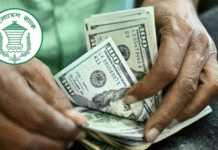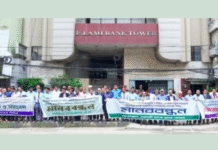
The economic growth in recent years has favoured the richest section of the society and the disparity increased between 2010 and 2016, said Debapriya Bhattacharya, a distinguished fellow of the Centre for Policy Dialogue, in a lecture yesterday.
The country, which posted 4.53 percent GDP growth during 1991-95, grew 6.32 percent from 2011 to 2015. The per capita GDP and per capita gross national income experienced an almost fivefold increase between 1990 and 2017.
“The benefits of our recent economic growth have been very unevenly distributed. This is an uncomfortable truth and this disparity remains concealed in the exciting discourse of the economic development.”
Bhattacharya made the observation while presenting the Abdul Ghafur Memorial Lecture 2018 styled ‘The Uncomfortable Truth: Recent Economic Growth Performance’ organised by the Bangladesh Institute of Development Studies at its office in Dhaka.
Within the country’s enviable growth performance one can notice that there are certain disquieting signals emanating from the economy, he said while citing various global reports such as Oxfam’s ‘The Commitment to Reducing Inequality Index 2018’, where Bangladesh was one of the worst performers.
Poor people as percentage of population more than halved to 24.3 percent between 2000 and 2016, but the pace of poverty reduction has slowed down in recent years.
Based on the Household Income and Expenditure Survey (HIES) by the Bangladesh Bureau of Statistics, the poorest 5 percent population lost out two-thirds of their share and now holds only a minuscule 0.23 percent of total income.
“We observed that not only poorest section of the society, even the lower middle class has experienced an erosion of its income share.”
On the other hand, the richest 10 percent, including the top 5 percent households, enhanced their share of income between 2010 and 2016.
The bottom 5 percent households lost asset share whereas the top 5 percent show noticeable rise in the same, he said.
“Asset inequality is increasing at a faster pace than income inequality and income inequality is increasing at a faster pace than consumption inequality.”
Manifestations of the trend of disparity may be observed not only in case of consumption, income and asset ownership, but also in areas of employment, human and regional development, he said.
Bhattacharya mentioned of sluggish trend in growth in employment, rising youth unemployment, disparity in health and education.
“This creates uneasiness among us and there is a mentality of denial among policymakers about the trend. But instead, we should accept that and discuss based on evidence.”
He went on to refer the high level of default loans and illicit capital outflow from the country to further his point.
“If all the resources got invested in the country in proper ways, then we could have had a radically different gainful employment and inequality situation.”
The recent period is characterised by a lack of political competition, weakening of voice and oversight institutions.
“One wonders whether enfeebling of the accountability mechanism has led to undermining economic governance and consequently marginalisation of the disenfranchised stakeholders in the distribution of benefits of development,” he added.
At the discussion, Mohammad Tareque, a former finance secretary, said life expectancy is rising despite inequality.
“If we look at it, we would not find the reason,” he said.
In response, Bhattacharya said life expectancy of a poor person in rural area would be much less than that of a well-off person in the urban area.
BIDS Director General KAS Murshid said a lot of the changes — massive demographic change, migration and emergence of a new class — are taking place.
“Under these changes, inequality would rise. But we have to see how much is tolerable,” he said, while calling for structural changes to address the inequality.
BIDS Research Director Binayak Sen said inequality is rising and this is not a new trend.
“The HIES data are yet to be finalised and data are being cleaned. But the situation is not as pessimistic as it has been shown,” he added.
Indirect tax accounts for nearly two-thirds of the tax collection, said Mustafizur Rahman, CPD distinguished fellow.
“It is time to see whether fiscal policy contributes to inequality,” he added.
A lot of money gets wasted for spiral in costs of projects under public sector, said M Asaduzzaman, BIDS Professorial Fellow.
“Inequality could be addressed better if the money would not get wasted,” he added.
CPD Executive Director Fahmida Khatun stressed on the need for ensuring voice and accountability, governance and rule of law.
“Because of lack of governance, resources become unequally distributed,” she said.
Source: The Daily Star.









